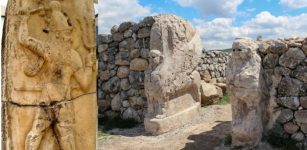Viking King – How Was He Elected And What Was Expected From Him?
Ellen Lloyd - AncientPages.com - In Viking society, kings were the most influential people, but having the highest social status was associated with responsibilities and particular requirements. Unlike pharaohs, Viking kings were not considered divine or unique.
Travis Fimmel as Ragnar Lothbrok in the TV series Vikings. Credit: History Channel - Copyright, fair use.
Ragnar Lodbrok claimed to be a direct descendant of the god Odin, but most Viking leaders were "ordinary" people, and they were viewed as exceptionally commanding men.
A man must have certain qualities and attitudes to become a great Viking leader.
It brings us to questions such as – Who could become a Viking king? Who was considered a worthy leader in the Viking society?
Kings Appeared At The End Of The Viking Age
It's important to remember that there were no Viking kings during the early Viking Age. The Viking society was divided into three social classes - the nobles or jarls, the middle class or karls, and the slaves or thralls.
Although the different social layers within the population were perceived as ordained by the Norse gods, it was still possible for one person to move from one class to another.
Vikings' kings appeared at the beginning of the Viking Age and were only regional leaders. The most potent individual Viking kings who ruled most Scandinavian lands appeared at the end of the Viking Age.
How Was A Viking King Elected And What Was Expected From Him?
The title of a king could be inherited. A man could also become a king if he had a good reputation and prominent supporters or was a successful military force leader.
Some were considered better-qualified leaders than others. High intelligence and capacity for strategic thinking were a requirement. A Viking king was expected to be ruthless toward his enemies, and there was no room for softness.
A Viking king must attend many important meetings with other chiefs; physical appearance was significant to gain respect. It could be achieved if a king had a strong body and wore beautiful clothes.
A Viking King Must Be Generous And Rich
Generosity was also a central trait of a worthy leader. A Viking mustn't be greedy. He was obliged to distribute wealth in gifts and by other means.
Gifts were given in weapons, gold rings, clothes, and sometimes ownership of land.
Our previous article on Ancient Pages discussed the importance of a Viking king's hird.
Members of a hird were Viking warriors and professional bodyguards prepared to die for their leader. An influential Viking chief had many enemies lurking everywhere. He had to be protected to stay in power, but Norse warriors did not fight for free.
A Viking leader who had a hird must be able to pay his warriors through gifts such as gold and silver, clothes, and weapons. Warriors also needed proper accommodation, food, and drink to protect their leader all around the clock. So, a Viking king had to be rich.
It's also worth mentioning that even a Viking king could be sacrificed.
The poem Ynglingatal tells how a Viking king was sacrificed in Sweden to restore his relationship with the gods.
Written by Ellen Lloyd – AncientPages.com
Updated on April 11, 2023
Copyright © AncientPages.com All rights reserved. This material may not be published, broadcast, rewritten or redistributed in whole or part without the express written permission of AncientPages.com and Ellen Lloyd
More From Ancient Pages
-
 Unique Flagship ‘Gribshunden’: Spectacular Discoveries
Archaeology | Oct 2, 2019
Unique Flagship ‘Gribshunden’: Spectacular Discoveries
Archaeology | Oct 2, 2019 -
 Tartarus – The Land Of The Dead – Mysterious Underground World
Featured Stories | Sep 13, 2015
Tartarus – The Land Of The Dead – Mysterious Underground World
Featured Stories | Sep 13, 2015 -
 First European Farmers’ Heights Did Not Meet Expectations
Archaeology | Apr 8, 2022
First European Farmers’ Heights Did Not Meet Expectations
Archaeology | Apr 8, 2022 -
 Legendary Beowulf Fighting Dragon Grendel In Heroic Poem Written In Anglo-Saxon England
Featured Stories | Aug 14, 2022
Legendary Beowulf Fighting Dragon Grendel In Heroic Poem Written In Anglo-Saxon England
Featured Stories | Aug 14, 2022 -
 Syamantaka – Divine Jewel With Magical Powers Was A Gift From The Sun God In Hindu Mythology
Featured Stories | Mar 1, 2019
Syamantaka – Divine Jewel With Magical Powers Was A Gift From The Sun God In Hindu Mythology
Featured Stories | Mar 1, 2019 -
 Unique Page From Rare Illuminated Manuscript And Thousands Of Treasures Found Under The Floor Of Oxburgh Hall
Archaeology | Aug 18, 2020
Unique Page From Rare Illuminated Manuscript And Thousands Of Treasures Found Under The Floor Of Oxburgh Hall
Archaeology | Aug 18, 2020 -
 Viking Funeral Traditions: Burning Ships, Complex Ancient Rituals And Incredible Up Helly Aa Festival
Ancient Traditions And Customs | Jan 28, 2017
Viking Funeral Traditions: Burning Ships, Complex Ancient Rituals And Incredible Up Helly Aa Festival
Ancient Traditions And Customs | Jan 28, 2017 -
 Real Giant Kojomkul Who Became A Folk Hero In Kyrgyzstan
Featured Stories | Dec 2, 2020
Real Giant Kojomkul Who Became A Folk Hero In Kyrgyzstan
Featured Stories | Dec 2, 2020 -
 Code Of Nesilim: Ancient Laws Of The Hittites
Ancient History Facts | Jun 14, 2018
Code Of Nesilim: Ancient Laws Of The Hittites
Ancient History Facts | Jun 14, 2018 -
 Ancient Mysteries Of Japan – Remarkable Story Of An Unknown Civilization And Lost Knowledge – Part 2
Civilizations | Sep 2, 2019
Ancient Mysteries Of Japan – Remarkable Story Of An Unknown Civilization And Lost Knowledge – Part 2
Civilizations | Sep 2, 2019 -
 Largest Ever Recorded Ancient Petroglyphs Found In Venezuela – Mapped
Archaeology | Dec 10, 2017
Largest Ever Recorded Ancient Petroglyphs Found In Venezuela – Mapped
Archaeology | Dec 10, 2017 -
 Baffling Archaeological Find At George Washington’s Mount Vernon
Archaeology | Jun 20, 2024
Baffling Archaeological Find At George Washington’s Mount Vernon
Archaeology | Jun 20, 2024 -
 Widespread Literacy In Biblical-Period Kingdom Of Judah – Study Confirms
Archaeology | Sep 11, 2020
Widespread Literacy In Biblical-Period Kingdom Of Judah – Study Confirms
Archaeology | Sep 11, 2020 -
 Secret Dwelling Place Of Reptilian And Dragon-Like Creatures In Europe
Featured Stories | Jul 18, 2018
Secret Dwelling Place Of Reptilian And Dragon-Like Creatures In Europe
Featured Stories | Jul 18, 2018 -
 New Inscriptions, Gold And Paint Showed Thanks To Restoration In Temple Of Edfu
Archaeology | Sep 20, 2024
New Inscriptions, Gold And Paint Showed Thanks To Restoration In Temple Of Edfu
Archaeology | Sep 20, 2024 -
 183-Million-Year-Old Fossils: Jurassic Marine World In A Farmer’s Field
Fossils | Jul 31, 2022
183-Million-Year-Old Fossils: Jurassic Marine World In A Farmer’s Field
Fossils | Jul 31, 2022 -
 Amazing Discovery: Great Pyramid Of Giza And Its Chambers Concentrate Electromagnetic Energy
Archaeology | Jul 31, 2018
Amazing Discovery: Great Pyramid Of Giza And Its Chambers Concentrate Electromagnetic Energy
Archaeology | Jul 31, 2018 -
 Is A Small Obsidian Artifact Linked To Expedition Searching For A Fabled City Of Gold 470 Years Ago?
Archaeology | Mar 1, 2024
Is A Small Obsidian Artifact Linked To Expedition Searching For A Fabled City Of Gold 470 Years Ago?
Archaeology | Mar 1, 2024 -
 Who Was The Mysterious Spitalfields Roman Noblewoman Dressed In Silk Found In A Sarcophagus In London?
Archaeology | Dec 21, 2020
Who Was The Mysterious Spitalfields Roman Noblewoman Dressed In Silk Found In A Sarcophagus In London?
Archaeology | Dec 21, 2020 -
 Ancient Traditional Practices Can Help Europeans Adapt To Climate Change
Archaeology | Aug 31, 2022
Ancient Traditional Practices Can Help Europeans Adapt To Climate Change
Archaeology | Aug 31, 2022

